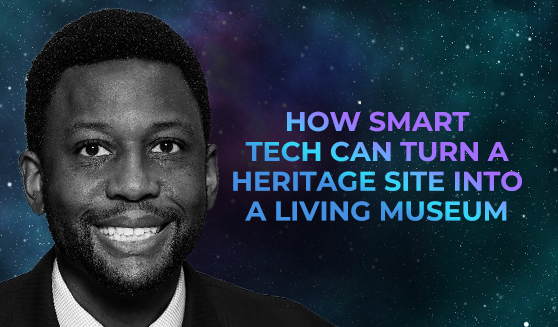
Why sustainability is the heart of the smart city revolution
The smart cities of the future will use tech to lower emissions, cut urban temperatures, and improve quality of life in highly populated areas.


We’ve written before about whether old cities can become smart cities. But what about historical sites and large areas of archeological importance? Is there an unsolvable tension between the old and the new – or can smart technology help to preserve regional heritage?
Smart tech leader Lawrence Eta will be speaking at #LEAP23. It’s an interesting time to hear from him, because he’s transitioning from his role as Chief Technology Officer at the City of Toronto, to the Royal Commission for Alula in Saudi Arabia – where he’ll be Executive of Digital and Analytics Program Expert.
Alula is a 2,000-year-old archaeological site in north-western Saudi Arabia, covering around 9,000 square miles (that’s 22,500 square km). The Royal Commission for Alula (RCU) was established in July 2017 with the objective to preserve and develop the site; safeguarding its outstanding natural and cultural significance, while integrating Alula into the Kingdom’s economic future. The focus on this site is a reflection of Saudi’s commitment to drive sustainable, sensitive tourism as detailed in the Vision 2030, with key tourism goals including 100 million annual visits.
We asked Eta about the opportunities he sees in this new role and new country, and he said:
“There are tremendous opportunities in the RCU to embed digital and data/analytics within the visitor, citizen and resident experience as a critical foundation.”
That foundation will enable “transformational generational impacts on social, sustainable, heritage and economic experiences,” Eta added.
This is a crucial point: that a historic site has the potential to improve the lives of future citizens, by creating economic opportunities and driving global interest in the country. The diverse research findings emerging from Alula are already creating a sense of curiosity among international tourists and scientists – like this peer-reviewed study by Dr. Rémy Crassard (Archaeologist), published in March 2022, which revealed sophisticated hunting practices of wild animals from the Late Neolithic period, using ancient stone-built animal traps called ‘desert kites’.
RCU-sponsored studies like this, which give clues as to the innovation and collaborative skill of earlier humans in the region, will make Saudi Arabia an increasingly exciting place for cultural tourism.
For Eta, new tech is central to the future success of RCU initiatives. Because tech provides a route to reimagine the experience that everyone has on-site, as well as allowing people to build a relationship with Alula without actually ever setting foot there.
Through digital tech and smart tools, the RCU can develop omni-channel experiences centred on this historic place; with “seamless and inviting” end-to-end interactive experiences for visitors, residents, and investors. It is technology that will build a thriving ecosystem for investment and tourism – and at the same time, digital tech will monitor, protect, and preserve the very things that make a site like Alula so special.
Combined with new policies and standards for digital acceleration in the delivery of county operations and destination services, and Saudi Arabia’s broader focus on developing local talent, the convergence of ancient Alula and modern technology will contribute to economic growth in the region – and in turn, that will ensure the future protection of precious history.
In Eta’s words, the RCU is dedicated to an unusual and exciting task: “creating a living museum without barriers, protecting heritage and culture for generations, and embedding nature.”

The smart cities of the future will use tech to lower emissions, cut urban temperatures, and improve quality of life in highly populated areas.

Discover the cities that rank highly for smart city preparedness, and learn why locally relevant innovation is more important than cutting-edge tech.

If you’ve ever thought about becoming a tech investor, read this – learn why investors are the quiet force shaping the future of the industry.

The smart cities of the future will use tech to lower emissions, cut urban temperatures, and improve quality of life in highly populated areas.

Discover the cities that rank highly for smart city preparedness, and learn why locally relevant innovation is more important than cutting-edge tech.

If you’ve ever thought about becoming a tech investor, read this – learn why investors are the quiet force shaping the future of the industry.